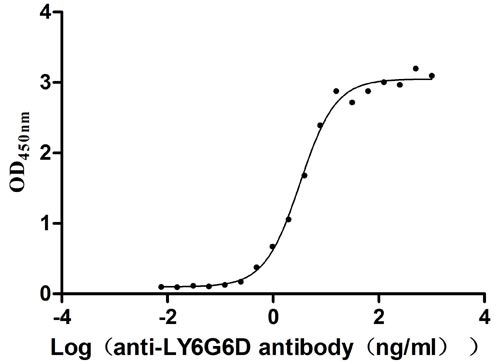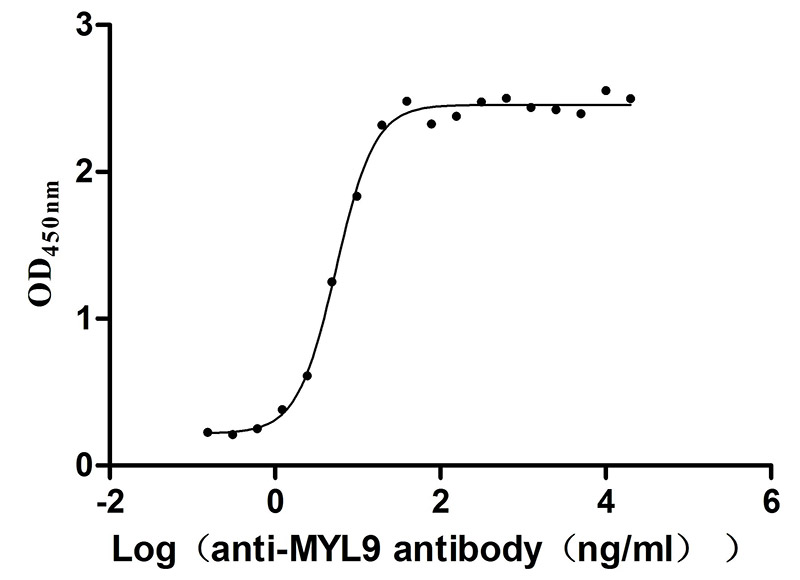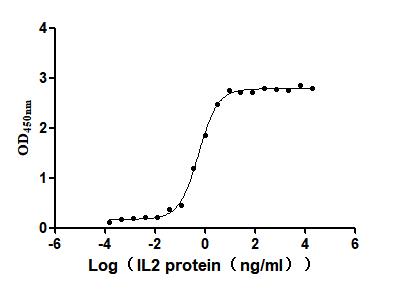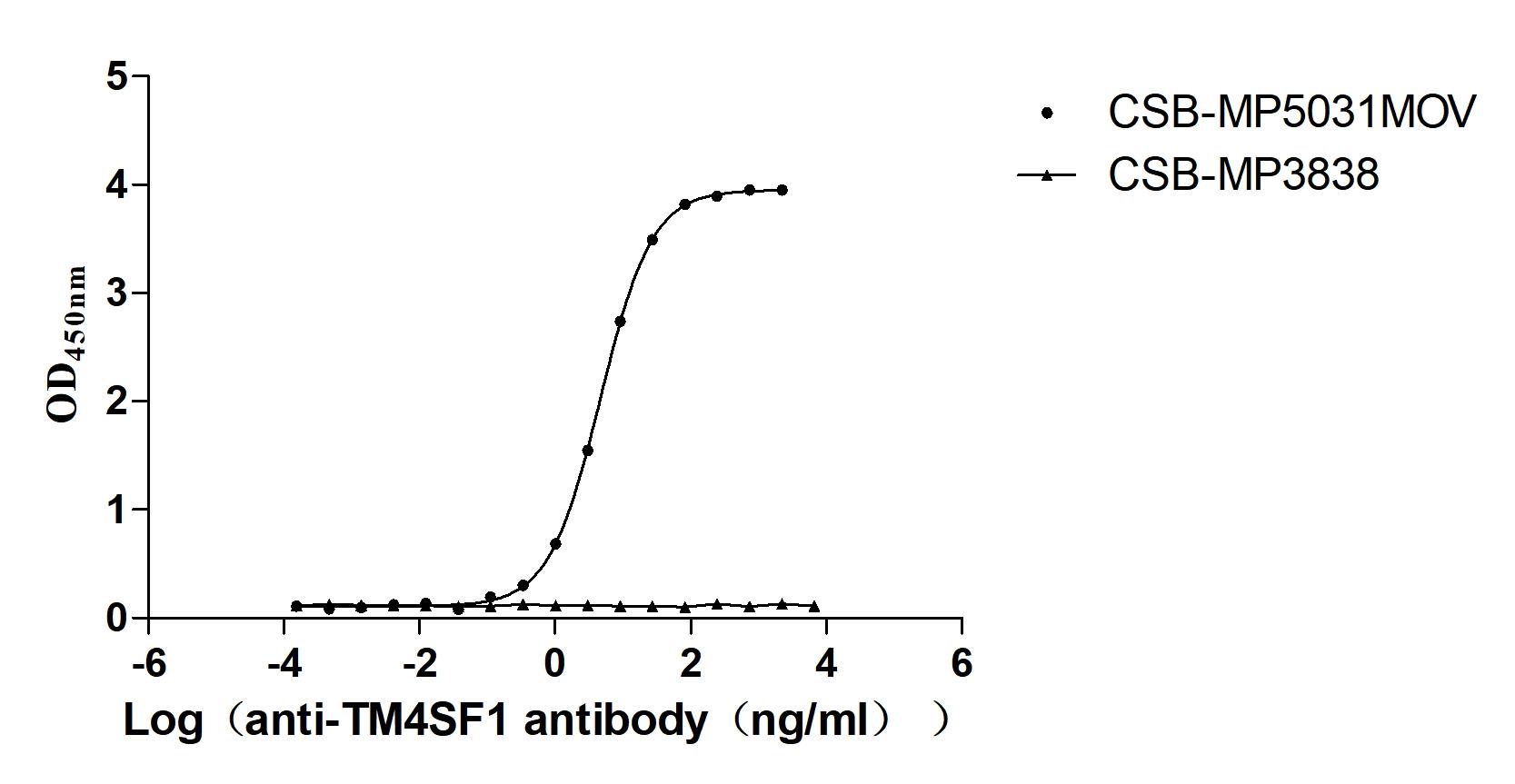Recombinant Mouse Natural cytotoxicity triggering receptor 1 (Ncr1), partial
-
货号:CSB-YP015549MO
-
规格:
-
来源:Yeast
-
其他:
-
货号:CSB-EP015549MO
-
规格:
-
来源:E.coli
-
其他:
-
货号:CSB-EP015549MO-B
-
规格:
-
来源:E.coli
-
共轭:Avi-tag Biotinylated
E. coli biotin ligase (BirA) is highly specific in covalently attaching biotin to the 15 amino acid AviTag peptide. This recombinant protein was biotinylated in vivo by AviTag-BirA technology, which method is BriA catalyzes amide linkage between the biotin and the specific lysine of the AviTag.
-
其他:
-
货号:CSB-BP015549MO
-
规格:
-
来源:Baculovirus
-
其他:
-
货号:CSB-MP015549MO
-
规格:
-
来源:Mammalian cell
-
其他:
产品详情
-
纯度:>85% (SDS-PAGE)
-
基因名:
-
Uniprot No.:
-
别名:Ncr1; Ly94; Natural cytotoxicity triggering receptor 1; Activating receptor 1; mAR-1; Lymphocyte antigen 94; Natural killer cell p46-related protein; NK-p46; NKp46; mNKp46; CD antigen CD335
-
种属:Mus musculus (Mouse)
-
蛋白长度:Partial
-
蛋白标签:Tag type will be determined during the manufacturing process.
The tag type will be determined during production process. If you have specified tag type, please tell us and we will develop the specified tag preferentially. -
产品提供形式:Lyophilized powder
Note: We will preferentially ship the format that we have in stock, however, if you have any special requirement for the format, please remark your requirement when placing the order, we will prepare according to your demand. -
复溶:We recommend that this vial be briefly centrifuged prior to opening to bring the contents to the bottom. Please reconstitute protein in deionized sterile water to a concentration of 0.1-1.0 mg/mL.We recommend to add 5-50% of glycerol (final concentration) and aliquot for long-term storage at -20℃/-80℃. Our default final concentration of glycerol is 50%. Customers could use it as reference.
-
储存条件:Store at -20°C/-80°C upon receipt, aliquoting is necessary for mutiple use. Avoid repeated freeze-thaw cycles.
-
保质期:The shelf life is related to many factors, storage state, buffer ingredients, storage temperature and the stability of the protein itself.
Generally, the shelf life of liquid form is 6 months at -20°C/-80°C. The shelf life of lyophilized form is 12 months at -20°C/-80°C. -
货期:Delivery time may differ from different purchasing way or location, please kindly consult your local distributors for specific delivery time.Note: All of our proteins are default shipped with normal blue ice packs, if you request to ship with dry ice, please communicate with us in advance and extra fees will be charged.
-
注意事项:Repeated freezing and thawing is not recommended. Store working aliquots at 4°C for up to one week.
-
Datasheet :Please contact us to get it.
靶点详情
-
功能:Cytotoxicity-activating receptor that may contribute to the increased efficiency of activated natural killer (NK) cells to mediate tumor cell lysis.
-
基因功能参考文献:
- Signaling via the natural killer cell receptor NKp46 (human) and Ncr1 (mouse) induced interferon-gamma (IFN-gamma) secretion from intratumoral natural killer cells PMID: 29329948
- these studies strongly support roles for NCR1 and its ligands in normal pregnancy promotion PMID: 28098245
- Ly49E-positive population is negative for NKp46 and CD8alphaalpha, expresses CD49a and CD103, and requires T-bet expression and IL-15 signaling for differentiation and/or survival. PMID: 28514662
- this study demonstrates the role of NCR1 in antibody response to mouse cytomegalovirus infection PMID: 28643847
- Our findings uncover a detrimental role of T-bet-dependent NKp46(+) ILCs in the development of CNS autoimmune disease. PMID: 28805812
- The results identify an unexpected phenotypic instability within NKp46(+) ILC3 that suggests a major role for environmental signals in tuning ILC3 functional plasticity. PMID: 27183613
- The s delineated the fungal ligands to be the Candida glabrata adhesins Epa1, Epa6, and Epa7 and demonstrated that clearance of systemic Candida glabrata infections in vivo depends on their recognition by mouse NCR1. PMID: 27736647
- it is demonstrated that NCR1 dampens allergic eosinophilic airway inflammation. PMID: 27580126
- this study using Ncr1-deficient mice, shows that NCR1 plays a critical role in controlling human metapneumovirus infection PMID: 28191644
- Rag knockout mice that possess fully functional NKp46(+) cells PMID: 26341825
- Ncr1-Noe proteins accumulate in the endoplasmic reticulum, and that the expression of Ncr1-Noe proteins, but not WT Ncr1, leads to increased Helios expression PMID: 26371250
- NK cell receptor NKp46 regulates graft-versus-host disease. PMID: 24882008
- Ifnar1(-/-) T cells had elevated expression of natural cytotoxicity triggering receptor 1 (NCR1) ligands upon infection, rendering them targets for NCR1 mediated NK cell attack. PMID: 24909889
- Data from knockout/transgenic mice suggest that activation of Ncr1 by endogenous (as yet undefined) ligands contributes to activation/maturation of uterine natural killer cells and likely makes critical contributions to implantation/placentation. PMID: 23806179
- Here, we demonstrate the regulation of T-cell mediated allergic responses, which is dependent on the NK-cell specific receptor NKp46 (Ncr1 in mice). PMID: 23878025
- NKp46 deficiency alone, or in combination with NKG2D deficiency, had no effect on frequency or function of NK cells PMID: 23649470
- NCR1 and NKp46 directly recognize a periodontal pathogen. PMID: 22457623
- NKp46/NCR1 plays an important role in controlling neoplasm metastasis PMID: 22308311
- downregulation of NK activity by NKp46 associated with silencing of Helios in NK cells; NKp46 critical for development of antiviral and antibacterial T cell response PMID: 22267813
- Fate mapping experiments demonstrated the stable expression of NKp46 on NK cells and allowed a reappraisal of the sequential steps of NK cell maturation PMID: 22021440
- The presence of the NCR1 receptor is imperative for the early clearance of S. pneumoniae. PMID: 21887255
- we investigated the molecular mechanisms controlling NKp46 interactions with its beta cell ligand and demonstrate that the recognition is confined to the membrane proximal domain and stalk region of NKp46 PMID: 21849674
- NKp46 identifies a functionally distinct NKT subset in that appears to be directly susceptible to leukemic transformation when IL-15 is overexpressed. PMID: 21364281
- IL-12 initiated local antitumor immunity by stimulating a subset of NKp46(+) lymphoid tissue-inducer (LTi) cells PMID: 20935648
- In vivo growth of 3-methylcholanthrene-derived tumor cells expressing high levels of NKp46 ligands is NKp46 and interferon-gamma dependent. PMID: 20404273
- NKp46 is essential for the development of type 1 diabetes PMID: 20023661
- NKp46 interacts with both viral hemagglutinins and the unknown tumor ligands via different mechanisms. PMID: 14504081
- Mouse NKp46 triggers Natural Killer cell effector function and allows the detection of NK cells in situ. PMID: 17360655
- a crucial role for NKp46/NCR1 in the in vivo eradication of some lymphoma cells. PMID: 19201876
- NKp46 plays a redundant role in the differentiation of intestinal IL-22(+) cells that mediate innate defense against Citrobacter rodentium PMID: 19846871
显示更多
收起更多
-
亚细胞定位:Cell membrane; Single-pass type I membrane protein.
-
蛋白家族:Natural cytotoxicity receptor (NCR) family
-
组织特异性:Selectively expressed by NK cells.
-
数据库链接:
KEGG: mmu:17086
STRING: 10090.ENSMUSP00000006792
UniGene: Mm.240231
Most popular with customers
-
Recombinant Human T-cell antigen CD7 (CD7), partial (Active)
Express system: Mammalian cell
Species: Homo sapiens (Human)
-
Recombinant Human Tumor necrosis factor ligand superfamily member 9 (TNFSF9), partial (Active)
Express system: Mammalian cell
Species: Homo sapiens (Human)
-
Recombinant Human Claudin-6 (CLDN6)-VLPs (Active)
Express system: Mammalian cell
Species: Homo sapiens (Human)
-
Recombinant Human Microtubule-associated protein tau (MAPT) (Active)
Express system: Mammalian cell
Species: Homo sapiens (Human)
-
Recombinant Human Lymphocyte antigen 6 complex locus protein G6d (LY6G6D) (Active)
Express system: Yeast
Species: Homo sapiens (Human)
-
Recombinant Human Myosin regulatory light polypeptide 9 (MYL9) (Active)
Express system: Yeast
Species: Homo sapiens (Human)
-
Recombinant Human Interleukin-2 (IL2) (Active)
Express system: Mammalian cell
Species: Homo sapiens (Human)
-
Recombinant Macaca fascicularis Transmembrane 4 L6 family member 1 (TM4SF1)-VLPs (Active)
Express system: Mammalian cell
Species: Macaca fascicularis (Crab-eating macaque) (Cynomolgus monkey)


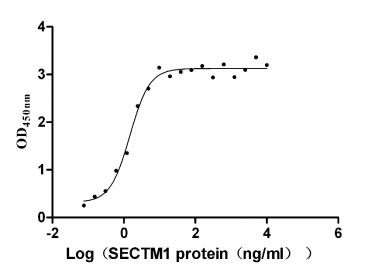
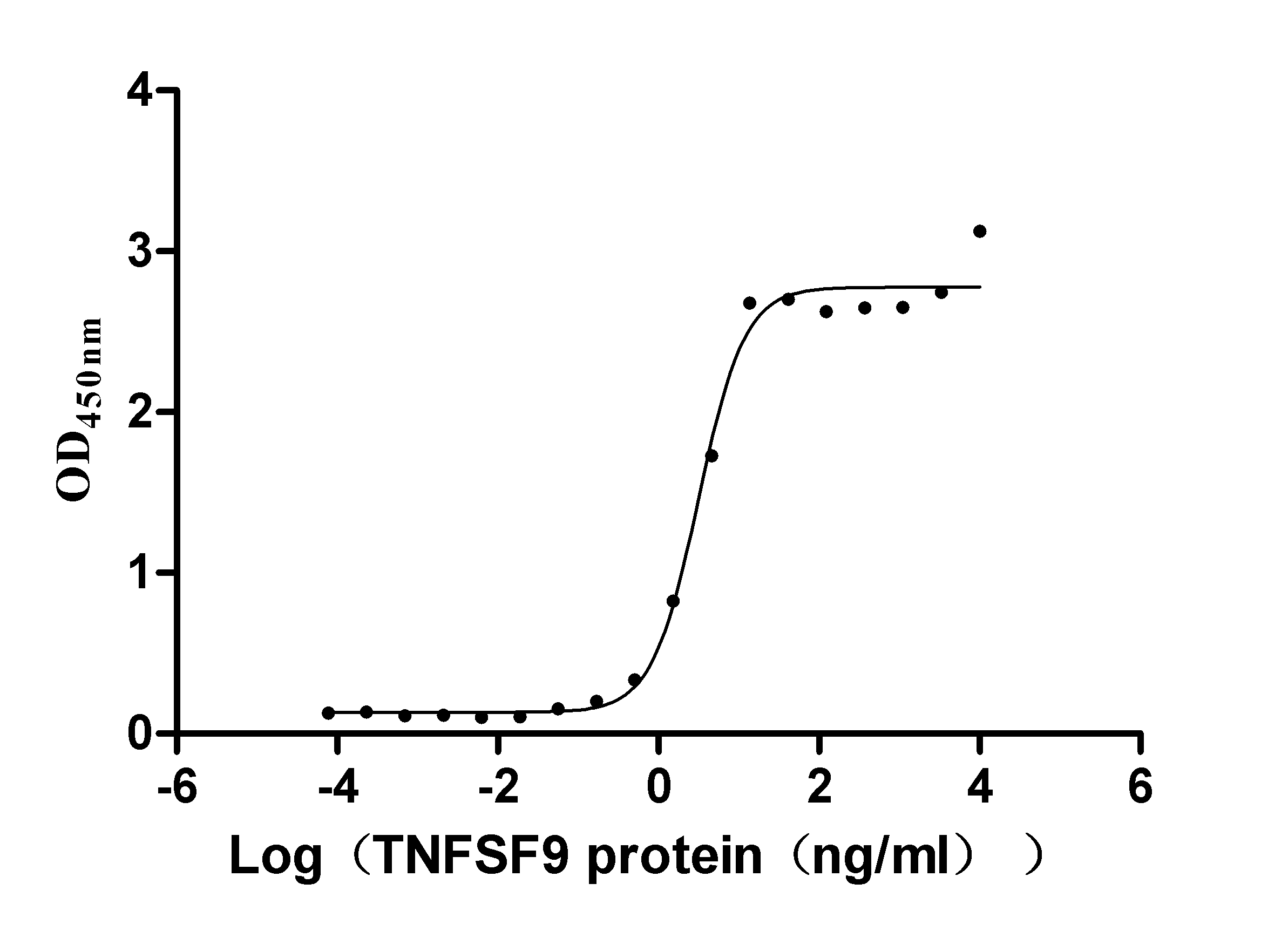
-AC1.jpg)
-AC1.jpg)
